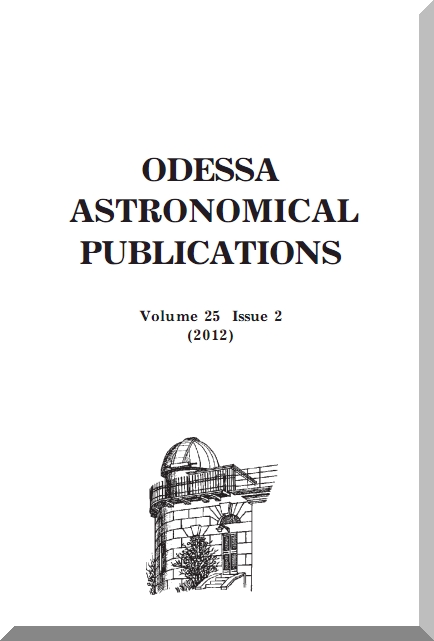TWO-COMPONENT VARIABILITY OF THE SEMI-REGULAR PULSATING STAR U DELPHINI
DOI:
https://doi.org/10.18524/1810-4215.2012.25.83340Ключові слова:
Stars, variable, pulsating, semiregular, individual, U DelАнотація
Photometric analysis of photometric variability of the semi-regular pulsating variable U Del is analyzed. From the international AFOEV database, 6231 brightness values in the time interval JD 2451602-55378 were chosen. For the periodogram analysis, we have used a trigonometric polynomial fit. Using the criterion of minimal variance of the approximation at arguments of observations, the optimal degree is s=1. Initial epoch for maximum is T0=JD2453340±3, the period P=1198±4d. Mean brightness at maximum is 6.624±0.005, at minimum 7.124±0.005, i.e. the amplitude is 0.499±0.005m. Besides this slow variability, there is a faster oscillation of a period of 119.45±0.06d, amplitude 0.303+0.005m and an initial epoch for maximum 2453215.1±0.5. These results are mean during the time interval after that analyzed in the catalogue of Chinarova and Andronov (2000). Also the method of "running sines" with a filter half-width Δt=0.5P. The local mean (averaged over a short period) brightness varies in a range 6.58-7.41m , the semiamplitude exhibits very strong variations from 0.01 to 0.46m . The phase is also variable - typically of a full amplitude of 0.5. Close to JD 2452589, occurred a phase jump by a complete period during a descending branch of a slow wave. This effect was not observed during other cycles. No significant correlation between mean brightness and amplitude of short-period oscillation was found. Despite significant variability of amplitude, the periodic contribution is not statistically significant. Also characteristics of individual brightness extrema were found. The study was made in a course of the international project "Inter-Longitude Astronomy" (Andronov et al., 2010) and national project "Ukrainian Virtual Observatory (Vavilova et al., 2012).Посилання
Andronov I.L.: 1994, Odessa Astron. Publ., 7, 49.
Andronov I.L.: 1997, Astron. Astrophys. Suppl., 125, 207.
Andronov I.L.: 1998, Kinem. Phys. Celest.Bodies, 14, 490.
Andronov I.L.: 2003, Astron.Soc.Pacif.Conf., 292, 391.
Andronov I.L. et al.: 2010., Odessa Astron. Publ., 23, 8.
Andronov I.L., Baklanov A.V.: 2004, Astronomy School Reports, 5, 264, http://uavso.pochta.ru/mcv
Andronov I.L., Chinarova L.L.: 2000, Odessa Astron. Publ, 13, 113.
Chinarova L.L.: 2010, Odessa Astron. Publ, 23, 25.
Chinarova L.L., Andronov I.L.: 2000, Odessa Astron. Publ, 13,116.
Kholopov P.N. et al: 1985, General Catalogue of Variable Stars, 4-th edition. Moscow: Nauka.
Kudashkina L.S.: 2003, Kinem. Phys. Celest. Bodies, 19, 193
Marsakova V.I., Andronov I.L.: 2012, Odessa Astron. Publ, 25, 60.
Samus N.N., Durlevich O.V., Kazarovets E V., Kireeva N.N., Pastukhova E.N., Zharova A.V., et al. General Catalog of Variable Stars (GCVS database, Version 2012Jan), http://www.sai.msu.su/gcvs/gcvs/
Thompson R.R.: 1998, J.AAVSO, 26, 119.
Vavilova I.B. et al.: 2012, Kinem.Phys.Cel.Bodies, 28, 85.
##submission.downloads##
Опубліковано
Як цитувати
Номер
Розділ
Ліцензія
Авторське право (c) 2016 Odessa Astronomical Publications

Ця робота ліцензується відповідно до Creative Commons Attribution-NonCommercial 4.0 International License.
Відповідно Закону України про авторське право і суміжні права N 3792-XII від 23 грудня 1993 року
